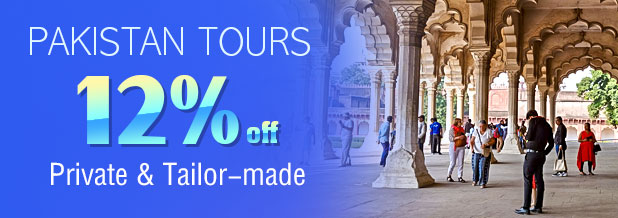Pakistan Weather
![]() Climate Patterns: Highland Climate, Lowland Climate, Arid Climate, Coastal Climate
Climate Patterns: Highland Climate, Lowland Climate, Arid Climate, Coastal Climate
 Average Temperature: 4-39℃ (40-102℉)
Average Temperature: 4-39℃ (40-102℉)
 Hottest Month: June and July: 24-35℃ (75-95℉) averagely; the highest often reaches over 40 degree Celsius (104℉) at noon in most areas.
Hottest Month: June and July: 24-35℃ (75-95℉) averagely; the highest often reaches over 40 degree Celsius (104℉) at noon in most areas.
 Coolest Month: December to February: 4-21℃ (40-70℉)
Coolest Month: December to February: 4-21℃ (40-70℉)
What is the weather like in Pakistan?
Located at latitude 23°30' to 36°45'N, Pakistan is in tropical and subtropical climate zones. But its weather further differs because of the different terrains. As a whole, the climate here is hot with less rain around a year and the precipitation concentrates in summer. The annual average temperature is 4-39℃ (40-102℉). The southern plains are influenced by the monsoon, so the precipitation is more than that of northern highland. The mean annual precipitation in Pakistan is less than 250mm, and decreases from northern mountains to the southern plain.Try to avoid travelling there in summer from May to August, as the temperature is much high at most time, and sometimes it is even over 45 degree Celsius (113 degree Fahrenheit).
Also, arrange your itinerary properly during the Ramadan, when most of the shops and restaurants open half day only. In 2026, it will start on February 17th; on March 19th, the Ramadan will end and local Muslims will celebrate Eid-Fitr with Long Street Feast and other kinds of activities.
-
Spring
March - April
Weather: Mild & Dry
Temperature:
10-32℃ (50-90℉)
Clothes to Wear:
long-sleeved shirt, long-sleeved dress, thin jacket, jeans, sneakers… -
Summer
May - AugustWeather: Hot & Sunny
Temperature:
18-39℃ (65-102℉)
Clothes to Wear:
T-shirt, sunhat, sunscreen cream, skirt, shorts, sandal …
-
Autumn
September - OctoberWeather: Cool & Sunny
Temperature:
15-32℃ (59-90℉)
Clothes to Wear:
T-shirt, long-sleeved shirt, long-sleeved dress, shorts, sneakers…
-
Winter
November - February
Weather: Cool & Sunny
Temperature:
4- 25℃ (40-77℉)
Clothes to Wear:
T-shirt, thin jacket, jeans, light sweater, trench coat, sneakers…
From June to August, Pakistan is influenced by the India Ocean Monsoon, so the rainfall is much higher in this time. In addition, the origin of the Indus River is mostly meltwater, and the high temperature accelerates the melting of ice and snow. The flood may occur when the two collide.
Northern and Western Pakistan
 Major Destinations: Peshawar, Quetta and Islamabad
Major Destinations: Peshawar, Quetta and Islamabad Weather Review: The
north and west highland regions have highland climate, with cold winter and
cool summer; and rainfall can be expected all year round. The summer in those
regions are cool and mild, when is suitable for visiting.er.
Weather Review: The
north and west highland regions have highland climate, with cold winter and
cool summer; and rainfall can be expected all year round. The summer in those
regions are cool and mild, when is suitable for visiting.er.Southern and Eastern Pakistan
 Major Destination: Lahore
Major Destination: Lahore Weather Review: The east and south plain enjoy lowland climate, which has cool winters and quite hot summers. Besides, the precipitation is much more in the monsoon season from June to August, so it’s not a good idea to travel here in summer.
Weather Review: The east and south plain enjoy lowland climate, which has cool winters and quite hot summers. Besides, the precipitation is much more in the monsoon season from June to August, so it’s not a good idea to travel here in summer.Westernmost and Southeastern Pakistan
 Weather Review: The westernmost and southeastern regions have arid climate, extremely dry year round. The annual precipitation here is less than 150mm, which is much lower than that of north highland at about 1,500mm.
Weather Review: The westernmost and southeastern regions have arid climate, extremely dry year round. The annual precipitation here is less than 150mm, which is much lower than that of north highland at about 1,500mm.Southern Coastal Pakistan
 Major Destinations: Karachi and Kashmir
Major Destinations: Karachi and Kashmir Weather Review: The weather in the southern coastal is influenced by coastal climate, with mild weather than other regions, and the annual temperature is about 6-35℃ (43-95℉), which is suitable for outdoor activities.
Weather Review: The weather in the southern coastal is influenced by coastal climate, with mild weather than other regions, and the annual temperature is about 6-35℃ (43-95℉), which is suitable for outdoor activities.
2. Dress appropriately. Although it is very hot and suitable for wearing shorts in summer, you’d better cover your body when visiting religious sites.
3. Pay attention to protect yourself from sunburn and drink more water due to the stronger sun in summer.
4. Make sure your luggage includes common drugs, like cold medicine, because of the lager temperature diffidence between day and night in Pakistan.
Recommended Pakistan Tours:
1. Historic Tour of Pakistan: 10 Days Lahore - Islamabad - Taxila - Peshawar - Swat - Islamabad
2. Autumn Tour in Hunza valley: 13 Days Islamabad - Chilas - Karimabad - Hopper Valley - Duiker valley - Passu - Khunjerab Pass - Karimabad - Gahkuch - Chilas - Islamabad - Taxila - Islamabad
3. Shandur Polo Festival & Hunza Valley: 14 Days Islamabad - Swat - Chitral - Bomburate - Mastuj - Shandur - Gahkuch - Karimabad - Duiker valley - Passu - Khunjerab - Karimabad - Naran - Islamabad

